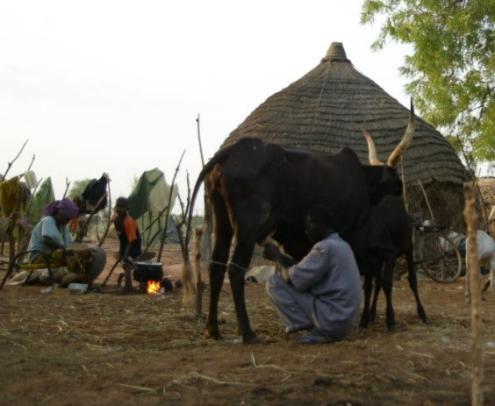Project in Burkina Faso
Assessment of Aflatoxin-related Health Risk for Milk Consumers in Rural and Peri-urban Areas in Burkina Faso
Timeframe: August 2018 - April 2021
Funding: USAID
Principal investigator (PI) and lead institution
Silvia Alonso, International Livestock Research Institute (ILRI)
Co-PI and collaborator institutions
- Augustine Ayantunde, ILRI
- Johanna Lindahl, ILRI
- Laurencia Ouattara/Songre, Institut de Recherche en Sciences Appliquées et Technologies (IRSAT)
- Amos Miningou, Institut de l'Environnement et de Recherches Agricoles (INERA)
Results
ILRI. 2021. Five keys to safer food. Flier. Nairobi, Kenya: ILRI. (English and French)
ILRI. 2021. Wealthier farms and healthier milk without aflatoxins. Flier. Nairobi, Kenya: ILRI. (English and French)
ILRI. 2021. Wealthier farms and healthier milk without aflatoxins. Poster. Nairobi, Kenya: ILRI. (English and French)
Some, H. and Ayantunde, A. 2018. Mapping of smallholder dairy value chains in Ouagadougou and Dori, Burkina Faso. Workshop report. Nairobi, Kenya: ILRI. https://hdl.handle.net/10568/114344
Sousa, F.M., Nombre, A., Miningou, A., Traore, S.A., Lindahl, J., Ayantunde, A., Sanchez, J. and Alonso, S. 2021. Aflatoxin M1-related health risk for milk consumers in dairy farms in rural and peri-urban areas of Burkina Faso. Poster presented at the virtual Agriculture, Nutrition and Health (ANH) Academy Week 2021, 29 June – 1 July 2021. https://cgspace.cgiar.org/handle/10568/108292
Project Plan
Milk and dairy products are a key source of essential nutrients, but they are also greatly vulnerable to contamination with microorganisms and chemicals that can cause illness in people. The high levels of aflatoxins in milk reported in various African countries, with their carcinogenic effect and suggested association with chronic malnutrition in children, show the importance of understanding the amount of such hazards in dairy products and identifying steps along the dairy supply chain where such levels can be reduced.
Objectives
- Map the dairy value chains operating in rural areas in Burkina Faso and in peri-urban Ouagadougou.
- Determine the presence of milk-borne pathogens in milk consumed in rural and urban settings.
- Assess the aflatoxin contamination in dairy cattle feed and milk in dairy production systems.
- Estimate the aflatoxin-related health risk for rural and urban consumers of liquid milk, with a focus on
children under 5 years, and pregnant and lactating women.
Expected Outcomes
The project generated primary evidence on the aflatoxin contamination levels in feed and milk in peri-urban and rural dairy systems in Burkina Faso and their health implications for dairy consumers. It would also provide improved understanding of the rural and urban dairy value chains operating in the country and of points of leverage for improved milk quality and safety.
Research Approach
The project surveyed traditional rural extensive and semi-intensive peri-urban dairy systems in Burkina Faso. The main dairy value chains will be mapped to describe the milk supply processes and actors. Samples of animal feeds and milk will be collected in dairy farms and tested for presence of aflatoxins and two milk-borne pathogens to determine the prevalence of these health hazards in both value chains. Lastly, quantitative risk assessment will be used to estimate the aflatoxin-related health risk associated with liquid milk intake.
More information
 October 2020 research update ALONSO VGM (Virtual General Meeting)
October 2020 research update ALONSO VGM (Virtual General Meeting)
- Fact sheet: Toxic Risk in Burkina Faso
- Page on ILRI website
Photo credit: S. Mann/ILRI
Feed the Future Innovation Lab for Livestock Systems is part of Feed the Future





